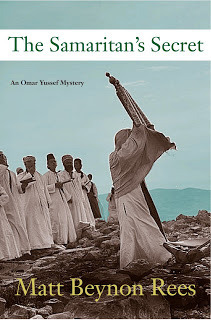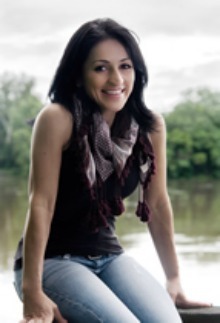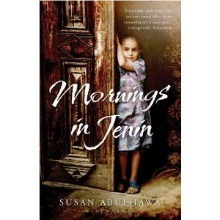Matt Rees's Blog - Posts Tagged "arabic"
Baksheeshed to the Bone

I'm guest-blogger today on Checkpoint Jerusalem, the excellent and delightfully varied blog by McClatchy Newspapers Middle East correspondent Dion Nissenbaum. Dion does a better job of rooting out interesting cultural angles on the news than anyone else covering the Middle East. Under the headline "Jesus was Right: Finding a Good Samaritan", Dion introduces my series of Palestinian crime novels and then posts this contribution from me:
It turns out Jesus was right.
I know, because I found a Good Samaritan.
Really, he was a good guy, and he actually was a Samaritan. There are still a few of them about.
In January, my new Palestinian crime novel, The Samaritan's Secret, was about to be published.
The story unfolds on a West Bank hilltop where the last remnants of the ancient Samaritan tribe live.
There are just 370 of them, high above the violent city of Nablus, near the site where they believe their ancient Temple stood.
To help my readers get a sense of the place, I decided to film a video clip using many of the locations from the book.
My friend, videographer David Blumenfeld. and I headed from our homes in Jerusalem to shoot the video.
The day before, I had spoken with a Samaritan priest to arrange some meetings and to be sure the enclosure around the Temple wouldn’t be locked.
“That depends on the money,” he said, in Hebrew. (The Samaritans mainly speak Arabic, but they also have Israeli ID cards and speak Hebrew. On their Sabbath, they speak nothing but Samaritan, which they believe is true ancient Hebrew.)
As a journalist, I’m not accustomed to paying to interview people.
“How much?” I asked.
“How much do you think?” he ventured.
Oh, no, we’re about to get all Middle Eastern, I thought. I hate haggling.
“Well, let’s say 200 shekels.” That’s about 60 bucks.
He scoffed.
“A thousand.”
I made groaning noises to show that such a figure was painful to me.
“Five hundred.”
“Five hundred,” he said. “See you tomorrow.”
When we reached the village, Kiryat Luza, the day was clear and sunny. The priest met us at the museum -- which he set up some years ago in his living room -- and we filmed a few scenes alongside his trove of photos and old documents.
Before we’d finished, he took out a receipt book: “I’ll do your receipt, shall I? What did we say? A thousand, wasn’t it?”
“No, it was five hundred.”
He started to tell me about how much work we were making him do. I gave him seven hundred and let it go.
Now, the priest was supposed to open the gates to the Temple compound for us. But somehow, after I’d paid him, that duty was delegated to another fellow.
As we filmed, the new guy complained that he needed to go home and eat. (The Samaritan village is about the sleepiest place I’ve ever seen. If anybody up there had anything pressing to do that necessitated hurrying me along, I’d have been very, very surprised.)
So, as we left, I gave him 100 shekels [about $25 US:] and thanked him with my warmest collection of Arabic words of praise.
“Something for the other guy?” he said, pointing at a figure lurking near the gate. “He had to wait too.”
I peeled off 20 shekels more. I hadn’t been squeezed this badly since I was first in the Middle East as an innocent 19-year-old backpacker, shucked for “baksheesh” by every Egyptian within a mile of the Great Pyramid.
David and I had filmed for four hours in a ridiculously hot January sun. I had read my cue-cards in five different languages, and I’d been fleeced until the leather on my wallet started to look raw. Sustenance was in order.
We went down the slope to the village to look for food.
There are only two establishments in the Samaritan village that in any way resemble eateries. “The Good Samaritan Restaurant” would’ve been the best bet, you’d have thought. But it serves no food -- only whiskey.
Next door, the “Guests and Tourists Paradise” was open. Three men smoked cigarettes lazily at one of the tables.
“Is it possible to eat?” I asked.
A tall, thin young man rose and welcomed us. We took a couple of Cokes from the fridge and sat. There was much muttering among the three smokers. Two of them disappeared up the street.
“I think they’ve gone home to ask Mamma to make our lunch,” I said to David.
Certainly no cooking took place in the kitchen at the back of the restaurant. The tall man smiled and nodded.
“No problem,” he said. “Food is coming.”
We waited... and waited... for half an hour. But the food did come, and it was good.
As we left, the young man told me his name was Samih. His father was the High Priest of the Samaritans. He gave me a free poster with historical information about the Samaritans and smiled very broadly.
Then he counted out my exact change.
I left a nice tip.
Published on April 28, 2009 05:58
•
Tags:
arab, arabic, east, good, hebrew, jesus, jew, mcclatchy, middle, nablus, newspapers, palestine, palestinians, samaritan, samaritans
A Voice for her People: Susan Abulhawa’s Writing Life interview
 Susan Abulhawa is a unique voice in contemporary fiction. She’s a Palestinian, born in Kuwait to a refugee family. She spent some years in an orphanage in East Jerusalem, her ancestral city, before university education in the US and she now lives near Philadelphia. She’s the founder of a wonderful charity, Playgrounds for Palestine, which aims to bring merry-go-rounds, slides and see-saws to the children of the West Bank and Gaza, as well as to refugee camps in Syria and Lebanon. As you’ll see from this interview, Susan’s writing life revolves around a leap she made at which many would balk. So that she could write her wonderful novel
Mornings in Jenin
, she mortgaged her house, went to a war zone, and returned with a passionate drive to write. What she wrote is a wrenching portrayal of a Palestinian family from 1948 – the foundation of Israel, which Palestinians call the “nakba,” the catastrophe – on through the civil war in Beirut and the second intifada. Mornings in Jenin is a bestseller whose poetic prose carries the resonance of the best Arabic fiction (writing which, due to the relative paucity of translation into English, we rarely get to enjoy; Susan wrote her novel in English). This many-faceted book has at its heart the most profound and tragic love-story imaginable. As a depiction of a violent history and of the bonds between lovers and siblings, Abulhawa’s novel gives a human voice to a people so often cast as a stereotype. How does she do it? Here’s what she has to say:
Susan Abulhawa is a unique voice in contemporary fiction. She’s a Palestinian, born in Kuwait to a refugee family. She spent some years in an orphanage in East Jerusalem, her ancestral city, before university education in the US and she now lives near Philadelphia. She’s the founder of a wonderful charity, Playgrounds for Palestine, which aims to bring merry-go-rounds, slides and see-saws to the children of the West Bank and Gaza, as well as to refugee camps in Syria and Lebanon. As you’ll see from this interview, Susan’s writing life revolves around a leap she made at which many would balk. So that she could write her wonderful novel
Mornings in Jenin
, she mortgaged her house, went to a war zone, and returned with a passionate drive to write. What she wrote is a wrenching portrayal of a Palestinian family from 1948 – the foundation of Israel, which Palestinians call the “nakba,” the catastrophe – on through the civil war in Beirut and the second intifada. Mornings in Jenin is a bestseller whose poetic prose carries the resonance of the best Arabic fiction (writing which, due to the relative paucity of translation into English, we rarely get to enjoy; Susan wrote her novel in English). This many-faceted book has at its heart the most profound and tragic love-story imaginable. As a depiction of a violent history and of the bonds between lovers and siblings, Abulhawa’s novel gives a human voice to a people so often cast as a stereotype. How does she do it? Here’s what she has to say:How long did it take you to get published?
It felt like forever. There was an 8 years span from the time I started writing Mornings in Jenin until it was finally published in 2010.
Would you recommend any books on writing?
I’ve never read a book on writing. I’m told that I should and I probably will one of these days. When I was writing Mornings in Jenin, I did get one as a gift. But I didn’t get beyond the first chapter. I don’t think my hesitation had anything to do with the book’s merits though. I just put it down when it talked about developing an outline or sketch of the story. I knew that I would never do that – write an outline or think ahead. So I just didn’t invest any more time in something that was going to lead me in a direction that my brain would not appreciate. I’m not a planner by nature. I follow my heart, usually into disasters and heartaches. But sometimes it takes me into miracles. Regardless, I’m just not very good at following instructions. The book I got was more or less that, or at least that’s how I perceived it and that’s why I put it down. That said, I just read Tony Parson’s answer to this exact question and he mentioned writing at least 1000 words a day. Apparently he got that advice from a book and I’m taking it from him. It’s a good bit of advice and has served me well for the past few days since I read it.
I’m sure Tony will be glad to hear it. What’s a typical writing day?
I would get up at 5am, make coffee, and sit at my keyboard and write straight through until it was time to wake my daughter up for school at 8am [she was in elementary at the time; now she’s up at 6 so that timing doesn’t work as well]. Then I’d start again from 9:30 until noon. The rest of the day I spent helping out at my daughter’s school, running or yoga, and a million other things single moms do.
That was then, when I had mortgaged my house for its full value so I could afford not to work and concentrate on writing. Now I’m paying off that mortgage and have to work a full time job as a medical writer, putting those biology degrees to some use. So I write when I can. Usually in the wee hours of the morning, in rare moments of blissful quiet and solitude, on trains, or when I’m depressed and therefore don’t care if everything else piles up.
How would you describe what “Mornings in Jenin” is about? And of course tell us why’s it so great?

It’s a story of love, and how that love is shaped by violence and persistent oppression – Love between a farmer and his land; between siblings; between a man and a woman; a mother and her children; a father and his children; love between friends. I think it’s up to readers to decide if it’s great or not. I’ll say that I put my heart into it. That ultimately my intentions in writing this story distilled to a single purpose – to be true to the characters by telling their stories with honestly, authenticity, and humanity.
Read the rest of this post on my blog
Published on April 08, 2011 01:24
•
Tags:
arabic, gaza, interviews, middle-east, mornings-in-jenin, palestine, palestinians, susan-abulhawa, west-bank, writers, writing-life



